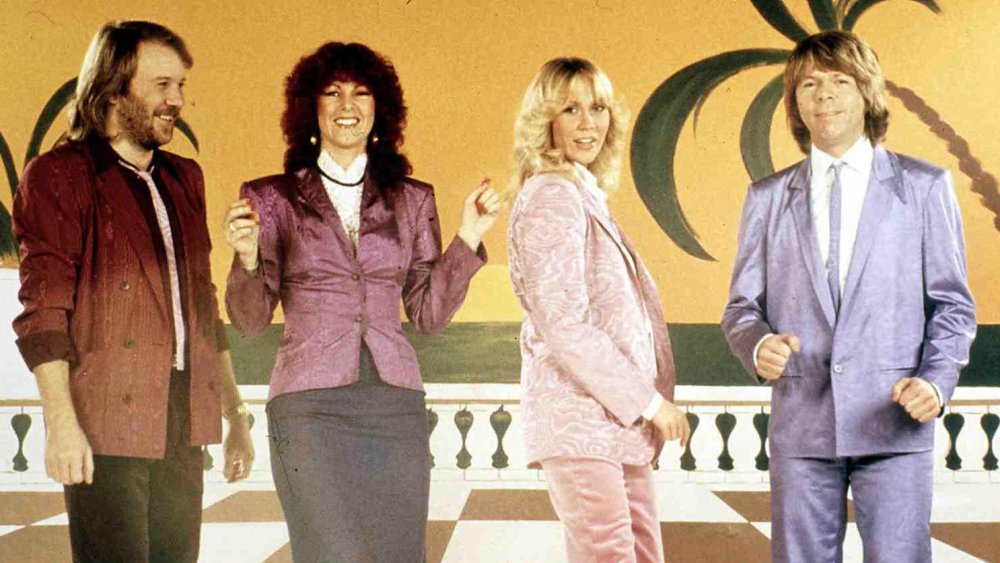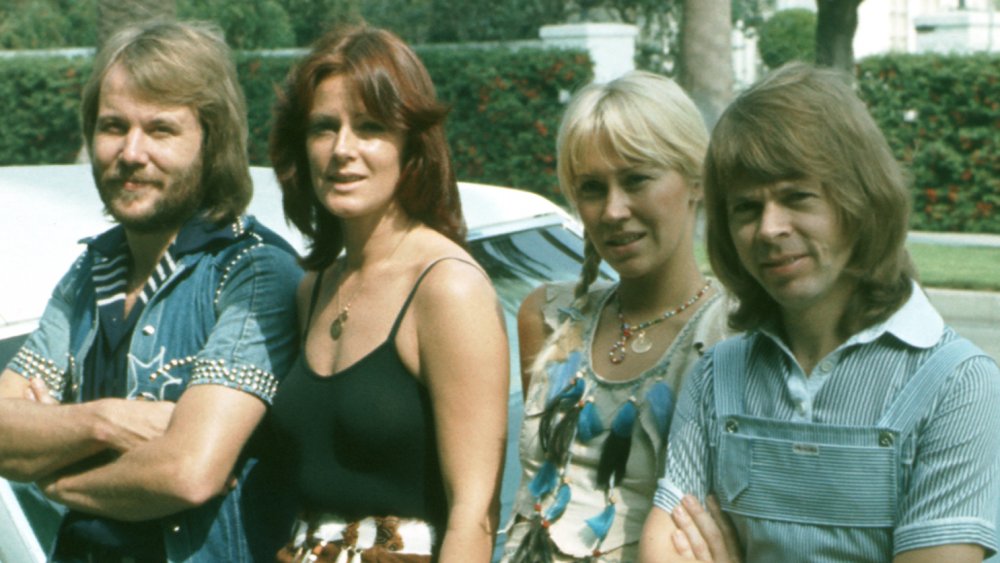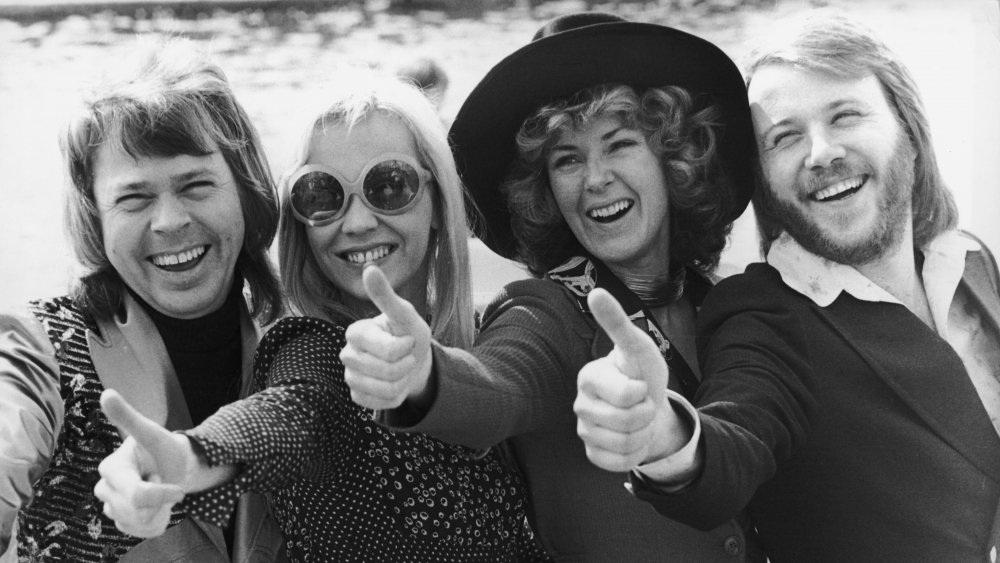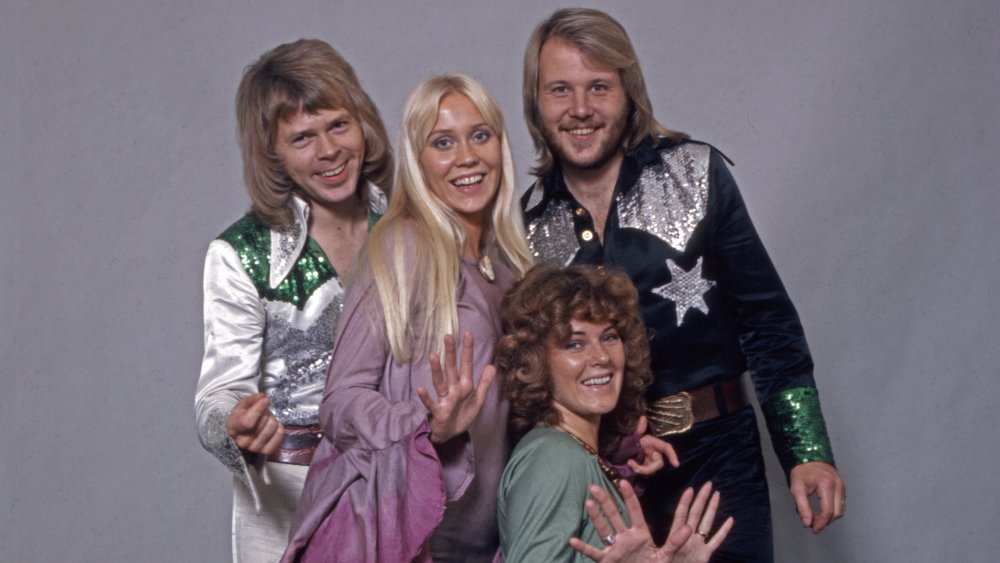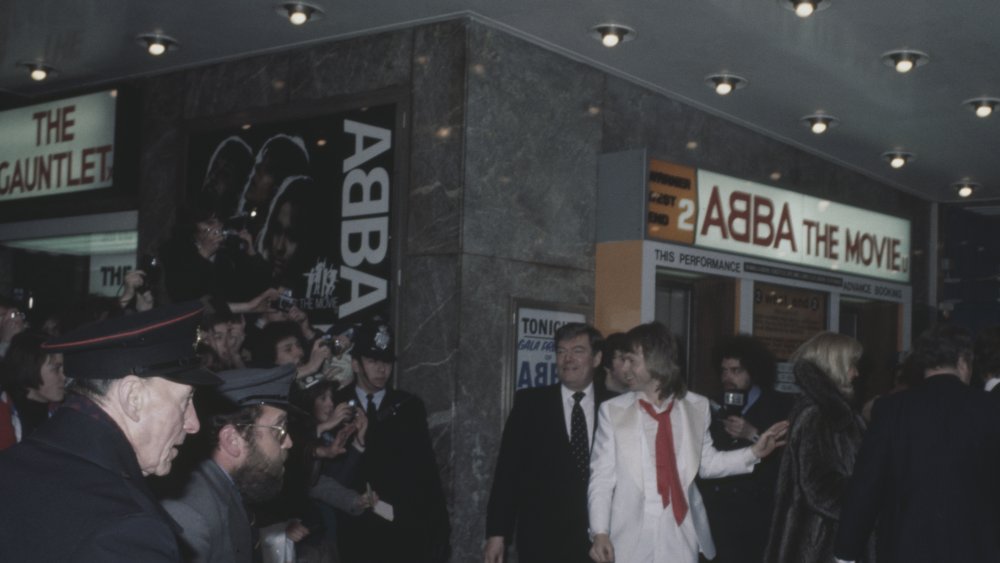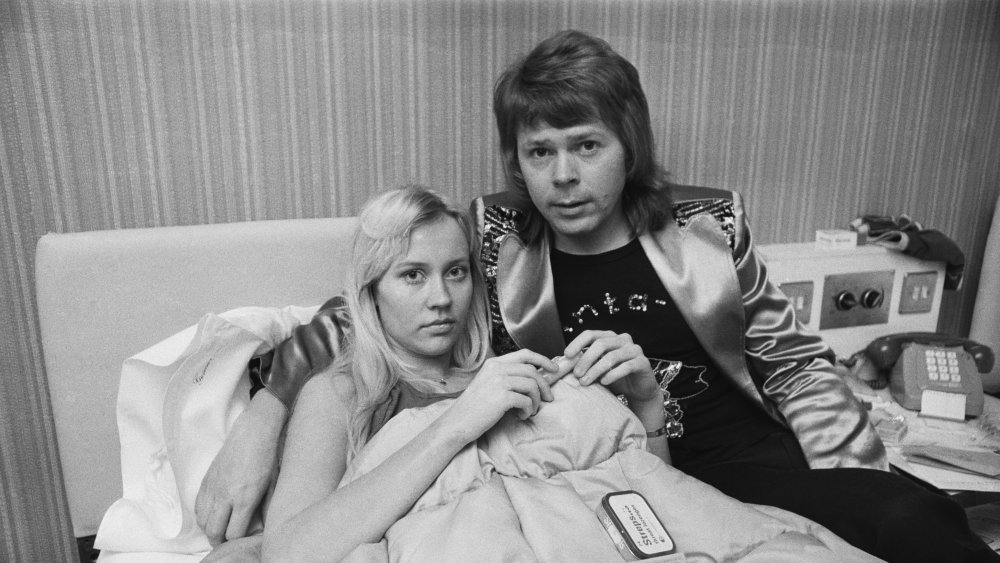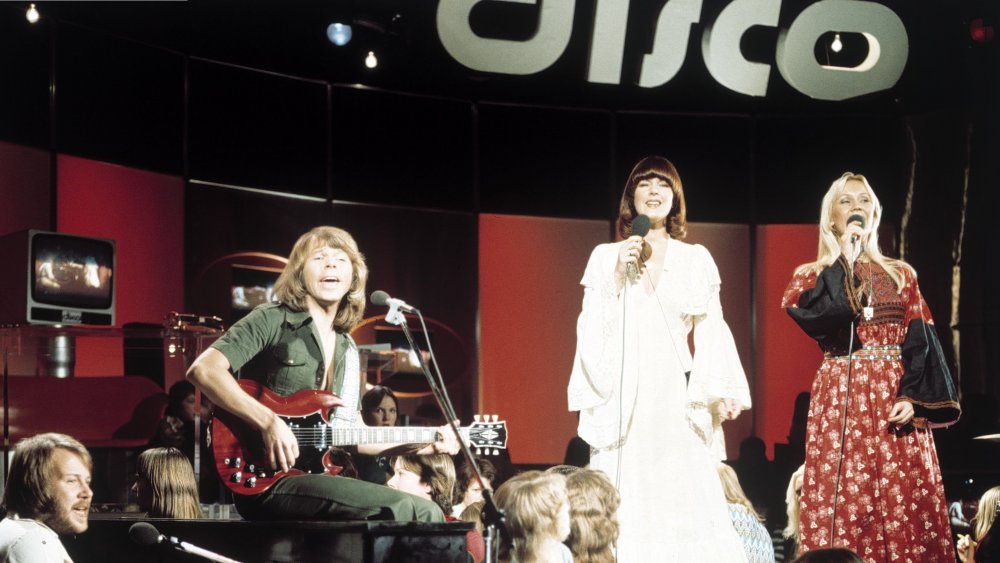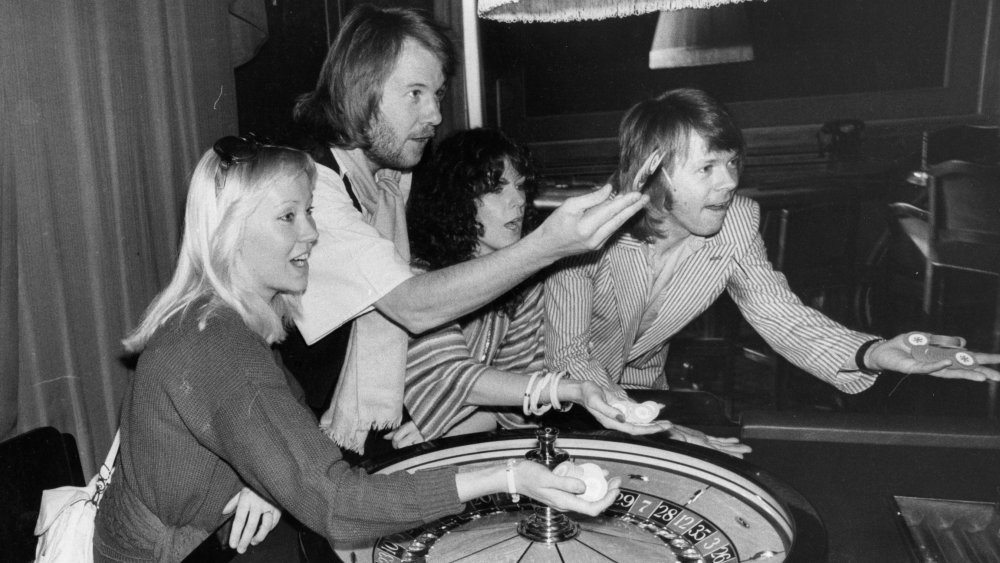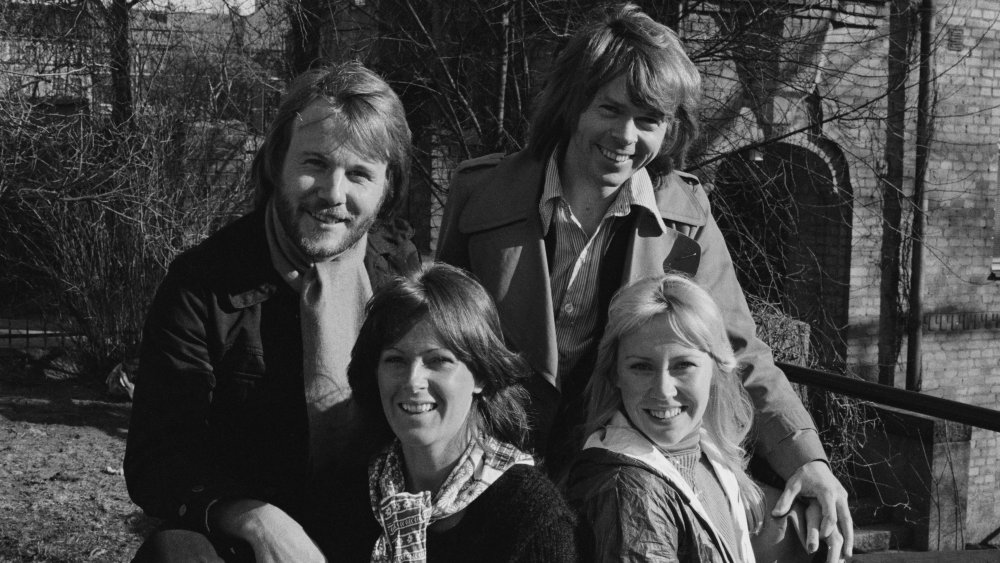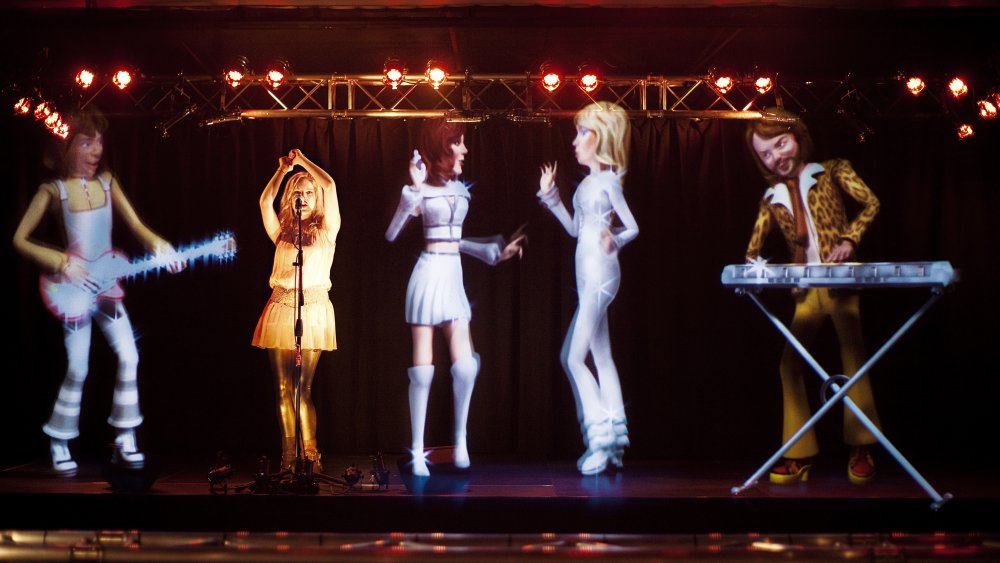The Untold Truth Of ABBA
From the recent surge of interest in the Eurovision Song Contest, which famously made Swedish supergroup ABBA worldwide pop stars virtually overnight, to the announcement that the quartet made up of two divorced couples who both split during the band's tenure will be releasing new music for the first time in decades and embarking on a tour using holographic technology, one might think there's little we don't know about ABBA.
For many of us, ABBA has been a steady presence in the pop culture pantheon throughout our lives — their music has always been on the radio, in movies, on television, and on the Broadway stage, serving as the hook-laden, catchy soundtrack of our highest highs and our lowest lows whether we like it or not. However, it turns out that there are plenty of unexpected twists and turns in the story of ABBA, with lots of surprising trivia and revelations along the way.
The members were all Swedish pop stars before ABBA
Before ABBA, all of the members were Swedish pop singers of varying popularity. Per AllMusic, Benny Andersson was a member of the Hep Stars, the "Beatles" of mid- to late-1960s Sweden with 20 Top 20 hits and nine chart-toppers. Benny met Björn Ulvaeus when the Hep Stars played a party with Björn's band, the Hootenanny Singers, and the two men started writing songs.
The Hep Stars eventually broke up thanks to the financial stress of making a never-released movie in the vein of the Beatles' A Hard Day's Night as well as the members' desires to go in different musical directions. During the last weeks of the Hep Stars, Benny met and started a relationship with Anni-Frid "Frida" Lyngstad, a pop and jazz singer who had won a 1967 Swedish national talent competition and a recording contract. Benny produced Frida's 1971 debut solo album, which featured the number-one Swedish hit "Min Egen Stad" ("My Own Town") with Benny, Björn, and Björn's wife Agnetha Fältskog on backing vocals. Agnetha was also already a Swedish star, with her own 1968 self-titled solo album that had topped the Swedish charts and her own hit single, "I Was So In Love."
ABBA failed at Eurovision before succeeding
As detailed by AllMusic, the four officially formed a Swedish supergroup after a 1972 hit by Benny and Björn called "People Need Love," which featured Frida and Agnetha on backing vocals. The success of "People Need Love" led to an invitation to enter the Swedish section of the Eurovision Song Contest, an annual singing competition among European countries that often features campy stage shows and costumes. Netflix recently introduced Eurovision to much of the United States for the first time via the parody Eurovision Song Contest: The Story of Fire Saga, starring a fake Icelandic band performing among actual past winners of the contest.
ABBA is known for winning the Eurovision Song Contest — in fact, Eurovision Song Contest features their iconic 1974 win in its opening scene. However, they had a false start before their eventual victory. The four entered the 1973 contest as Björn, Benny, Agnetha & Frida and placed third among the Swedish entrants with the song "Ring Ring." A year later, now using the name ABBA, an acronym of the members' first names (Agnetha, Benny, Björn, and Anni-Frid), they entered with the song "Waterloo" and won first for Sweden and then for all of Europe, making them the first Swedish group to win Eurovision. "Waterloo" was eventually voted the best song in the history of the contest at Eurovision 50, a celebration of Eurovision's 50th anniversary.
People thought ABBA were one-hit wonders
At first, ABBA seemed destined to be one-hit wonders: After the worldwide success of "Waterloo," their first albums and subsequent singles didn't chart, including the apparently cursed song "Ring Ring," which was, according to The Guardian, "pretty much ignored in the UK." In the same article, Björn explains that they were still experimenting with their sound and were "trying to be more like the Sweet, a semi-glam rock group. Which was stupid because we were always a pop group." Their first European tour of 1974-75 featured several poorly attended shows, causing the band to scrap plans to play in the United Kingdom, France, Belgium, and other countries and to cancel Switzerland shows due to poor ticket sales.
In the summer of 1975, the group went back to their roots and toured small Swedish "folkparks," as they had done before "Waterloo." They also released their third album, ABBA, which produced their first international smash hits since "Waterloo," including "S.O.S." and "Mamma Mia," and kicked off Australia's lifelong love affair with the group — "Mamma Mia" was number one on the Australian pop charts for ten weeks. By the end of the year, they had enough hits for a Greatest Hits album, which they released in Sweden in late 1975 and the rest of the world in early 1976. This compilation also included a new song, "Fernando," another international smash that was number one in 13 countries and Australia's best-selling single of all time.
ABBA pioneered reality entertainment
Firmly entrenched in superstardom after the successes of ABBA and Greatest Hits, the band released their fourth studio album, Arrival, in 1976. In his Pitchfork review, Simon Goddard notes that the band's image is one of international pop idols at this point in their history, starting with the LP cover, on which "they finally looked like superstars, the kind who travelled in private helicopters like the one on the cover in which they're cocooned with curiously cool expressions." Arrival is perhaps most notable for being the parent album of the single "Dancing Queen," arguably ABBA's signature song and their only song to ever hit number one in the United States. In a 2016 Guardian interview, Frida remembered bursting into happy tears upon hearing just the backing vocals and called "Dancing Queen" "absolutely the best song ABBA have ever done."
In 1977, the band set off on a tour of Europe and Australia, which brought in a total of 100,000 and 150,000 concertgoers, respectively. The band also began filming ABBA: The Movie during this tour, a supposed behind-the-scenes tale of an Australian DJ attempting in vain to interview the band during their tour, which Rolling Stone described as "a mix of concert footage, music videos, "candid" backstage footage (filmed months later at a Stockholm hotel) and man-on-the-street interviews." More a predecessor to carefully plotted and planned reality TV than a typical documentary, ABBA: The Movie was released in conjunction with their fifth LP ABBA: The Album.
ABBA kept on after a big divorce
In 1978, Benny and Björn made a lasting contribution to the recording industry when they bought a former movie theater and built and founded Polar Music Studio in Stockholm, Sweden. Lauded as one of the all-time great recording studios, it was used by Led Zeppelin to record their album In Through The Out Door, as well by a diverse assortment of other artists, including the Beastie Boys, Celine Dion, the Ramones, and Genesis, until it closed and moved to a new location in 2004.
1978 also saw the marriage of longtime couple Frida and Benny, which was soon followed by Agnetha and Björn's announcement in January 1979 that they planned to divorce. The band stayed intact and moved forward despite the split, seemingly using the experience to lean into what The Guardian called "their ability to counterpoint joyous melodies with melancholic, even depressing, lyrics." The article calls the song "If It Wasn't For The Nights" "a disco song with a lyric of utter despair," and Björn confirmed, "There were times that last autumn I was with Agnetha that I had those nights myself."
ABBA came to disco later than you think
Despite starting the year with two of their members breaking up, 1979 brought two ABBA albums, Voulez-Vous and Greatest Hits 2, and another tour, which included the United States for the first time. In her autobiography As I Am, Agnetha described the tour in less than rosy terms: "Björn and I were agreed about doing this tour together, despite the divorce, so we had to form a new relationship with each other and work together in a new way. It was an unfamiliar situation for all four of us — an ordeal by fire." Despite the band's personal problems, the tour was hugely successful and ended with six sold-out shows at London's Wembley Arena, recordings of which were released as a live album years later in 2014.
Although we associate ABBA with disco music to this day, Voulez-Vous was the band's first serious foray into disco. The Quietus describes the song "Summer Night City" as "a frenzied burst of manic disco [...] meanacing where ABBA was once unthreatening." Reviews pointed out the band's new sound and made unflattering comments, such as Melody Maker's snide "It was only a matter of time before they sidled into the Gibb Brothers' disco penthouse." The Quietus points out that the band was in crisis during the making of this album and could no longer rely on their image of "a collective of amiable, committed couples making pure songs about life and love." The tumultuous result was "unfamiliar, disconcertingly sexy disco music."
The Winner Takes It All might not actually be personal
In March 1980, ABBA played their last tour, which consisted of 11 sold-out shows in Japan, including six at Tokyo's famous Budokan arena. In July, they released the single "The Winner Takes It All," which is yet another famous ABBA breakup song. This song in particular is widely misunderstood to be about Björn and Agnetha's divorce: The Guardian points out that "Björn famously wrote about divorce as a competitive act featuring triumphant winners and fallen victims," but Frida counters that "that song was for so many people, not just Björn and Agnetha." Björn agrees, stating, "it was fiction [...] there were no winners in our divorce."
Agnetha seems to disagree, though. In a 2013 interview with the Daily Mail, she named the song as her ABBA favorite and said, "Björn wrote it about us after the breakdown of our marriage. The fact he wrote it exactly when we divorced is touching really. It was fantastic to do that song because I could put in such feeling." Regardless of its actual meaning and significance, the song was another worldwide hit and ABBA's last top-ten single in the United States.
Their seventh album, Super Trouper, followed in November. AllMusic notes that Super Trouper found the band "always trend-conscious, taking account of the passing of disco and returning to the pop/rock sound typical of their early albums," further highlighting the fact that ABBA's tenure as a disco group was actually quite brief.
ABBA had a political side
1981 brought more personal upheaval for ABBA. Björn remarried in January, and just one month later, Benny and Frida announced that they were divorcing. In fact, Benny was remarried by the end of the year. Amid everything, they released their last album, The Visitors.
UDiscoverMusic notes a contrast with the band's former efforts: "The lyrical themes are darker, the synths predominate and the melodies are sometimes less immediately accessible than before." Indeed, the title track was later revealed to refer to "secret meetings without the approval of the totalitarian governments in the Soviet-dominated states," according to The 100 Greatest Bands of All Time, and the song "Soldiers" hints at further subtle political commentary with lyrics like, "They drum their drums and look so strong / You'd think that nothing in the world was wrong." Still, the album also contained the now-ubiquitous ABBA themes of shattered relationships and broken hearts, most dramatically in "One of Us," their final big hit.
As discussed on the official ABBA site, 1982 saw the release of a double compilation album, The Singles — The First Ten Years, which included two new songs. The single "The Day Before You Came" performed disappointingly, and at the end of the year, ABBA decided to take a break. It was the last time they would work together as a group.
The members all had successful careers after ABBA
It seems likely that one reason for ABBA's break that ended up being the end of the band was Björn and Benny's collaboration with Broadway lyricist Tim Rice on the musical Chess. They released the music on an album before the premiere of the stage show, telling the story of a love triangle between an American chess master, a Soviet chess master, and the woman who manages one and falls in love with the other. Like some of the lyrics from The Visitors, Chess focused on the Cold War and used actual historical US vs. USSR chess matches as inspiration. The 1984 concept album was much more successful than the actual 1986 musical and featured Murray Head's chart-topping single, "One Night In Bangkok," which might be the best example of a funny old song that you think will kill at karaoke until you realize the lyrics have aged very, very poorly.
Agnetha made three solo albums and then took a 17-year-long hiatus from recording and became quite reclusive, focusing on astrology, yoga, and horses until her 2004 comeback, according to Smooth Radio. Frida recorded her solo album Something Going On in 1982. The record featured production and drumming from Phil Collins, enjoyed good reviews, and sold almost two million copies. Frida made a second solo album and, eventually, married a Swiss prince. Her official name and title became Princess Anni-Frid Synni of Reuss, Countess of Plauen.
ABBA were huge in the '90s despite being inactive
As noted by Britannica, ABBA was relatively inactive as an entity throughout the late 1980s and 1990s, but it was during this time that their status as pop muses and icons made them ubiquitous, particularly in Australian popular culture, where they had always enjoyed a particularly strong sort of ABBAmania. The Australian parody/tribute group Björn Again started in 1988 and continues touring and playing to ecstatic crowds of dancing queens to this day. In 1992, British dance pop duo Erasure released an EP of ABBA covers, Abba-esque, which topped UK charts for five weeks. 1992 also saw the release of the ABBA: Gold: Greatest Hits compilation, which became their best-selling album of all time: As of August 2019, according to Official Charts, it had sold 5.45 million copies and was the longest-running Top 100 album of all time.
Australian ABBA fandom inspired two now-classic 1994 movies, with both Muriel's Wedding and Priscilla, Queen of the Desert heavily featuring ABBA music in the soundtracks and plots. Not to be outdone, ABBA Teens, a Swedish tribute group featuring teenagers performing ABBA covers, enjoyed worldwide popularity in 1999 before changing their name to the A-Teens and adding non-ABBA songs to their repertoire.
ABBA pioneered the jukebox musical
Of course, 1999's real ABBA story was the wild success of Mamma Mia! Premiering in London's West End, Mamma Mia! wasn't the first jukebox musical (one featuring a body of previously released work, often from a single artist), but as Sarah Larson pointed out in The New Yorker, it popularized the genre and made it the dominant modern musical format, for better or for worse. The show has run in 40 countries on five continents for 54 million people and was adapted into the 2008 movie Mamma Mia!, another huge success that holds several records. Both Benny and Björn made uncredited cameos in the movie as, respectively, the "Dancing Queen" piano player and a Greek god.
The sequel, 2018's Mamma Mia!: Here We Go Again, doubled down on its spectacular kitschiness by bringing in Cher as a long-lost glamorous grandmother. Cher went on to release her first tribute album of ABBA covers, appropriately titled Dancing Queen, in which "the 72-year-old makes ABBA songs not only sound like they should've been written for her in the first place but like they firmly belong in 2018," according to Rolling Stone.
They're back! (sort of)
After years of saying no to public reunions, including their 2010 induction into the Rock and Roll Hall of Fame, ABBA has finally gone back into the studio together and, according to The Independent, are planning on releasing five new songs this year to make up for the fact that their planned reunion tour has been postponed due to the coronavirus pandemic.
The tour is unusual in that they are planning an "avatar tour," to be called "ABBAtar," in which they will appear holographically as their younger selves. Deadline quotes Björn's explanation of the process of creating the avatars: "They photographed us from all possible angles, they made us grimace in front of cameras, they painted dots on our faces, they measured our heads." Deadline also reported that producer Judy Cramer has suggested the possibility of a third entry in the Mamma Mia! movie franchise, claiming, "I was meant to have been getting on with that, in my head, during these months. But then I got hit with Covid fog."
A PBS documentary is set to air in August 2020, and its name is especially apt as we await new music from the band who has become synonymous with the very concept of pop music: ABBA Forever: A Celebration.
